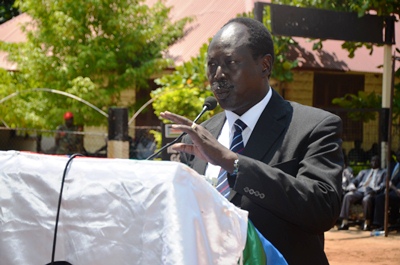Jonglei government to reduce fish prices in Bor
April 27, 2017 (BOR) – The Ministry of Agriculture & Forestry is now implementing a fishery project that aims to reduce the fish prices in the market.

The fishermen refused to comply and instead declined the fish supply in the market.
The state directorate of fisheries repaired the old ministry’s engine-driven boat to be used to collect fish from the fishing areas to the market in Bor. The government buys fish from the fishermen and sell it to the residents between SSP130 and SSP150 a kilogramme.
“The number of kgs one can buy for family consumption is up to five or 10 kilogrammes of fish. One kg of tilapia is SSP150, and the rest of the fish species is SSP130. We hope the prices will drop a bit, that is the aim of this project. We are not allowing anybody to get more than the family feeding. Only the restaurants and hotels can buy large quantities. We don’t want someone to go and sell fish again,” said Manyok Maper, the State Director of fisheries on Thursday.
Since December 2016, the fish prices hiked to SSP1,500 per fish in Bor, a condition which the ministry is now working to revert. Fish would be collected from various places like Diam-diam in Twic East and other places in Duk islands to be sold in Bor by the government. This would eliminate the hawkers or middlemen who contributed to price hiking.
According to Maper, the project will continue supplying Bor with fresh fish from the Sudd lines were fish species are in abundance, so long as the boat has no major mechanical problems.
Consumers, however, are not sure if this will continue as the government does not always stick to its promises.
“Although the government has brought these fish today, the hawkers will still destroy this tomorrow. It is good the government has done it this way, the project should be monitored closely because people are starving,” said one of the women consumers in Bor at the dock.
Another man who identified himself as Mayoola suggested that the government policy of selling fish in kilogrammes had made it difficult for the majority of the low-income earners to afford what they need. He added that the fish should be sold in pieces with prices ranging from SSP100 to SSP300 per fish depending on the fish size.
“I thank the government for what they have done. But still, the price they gave today seemed to be affordable, but not at all. When you weigh one fish, it can go to six kilos, and each kg is SSP130, this can cost almost SSP700. Many consumers simply cannot afford it. You cannot get money to buy that fish, so prices must be reviewed. I suggest that fish should be sold in pieces, not in kilogrammes. If one cost SSP200 to SSP300, then the public will be able to afford,” Mayoola suggested.
This barge was constructed in 2009 by the government and used in 2011, but it stopped due to technical problems. The barge takes weeks collecting large quantities of fish from different places and keeps the fish in freezers before they are sold in Bor.
(ST)
